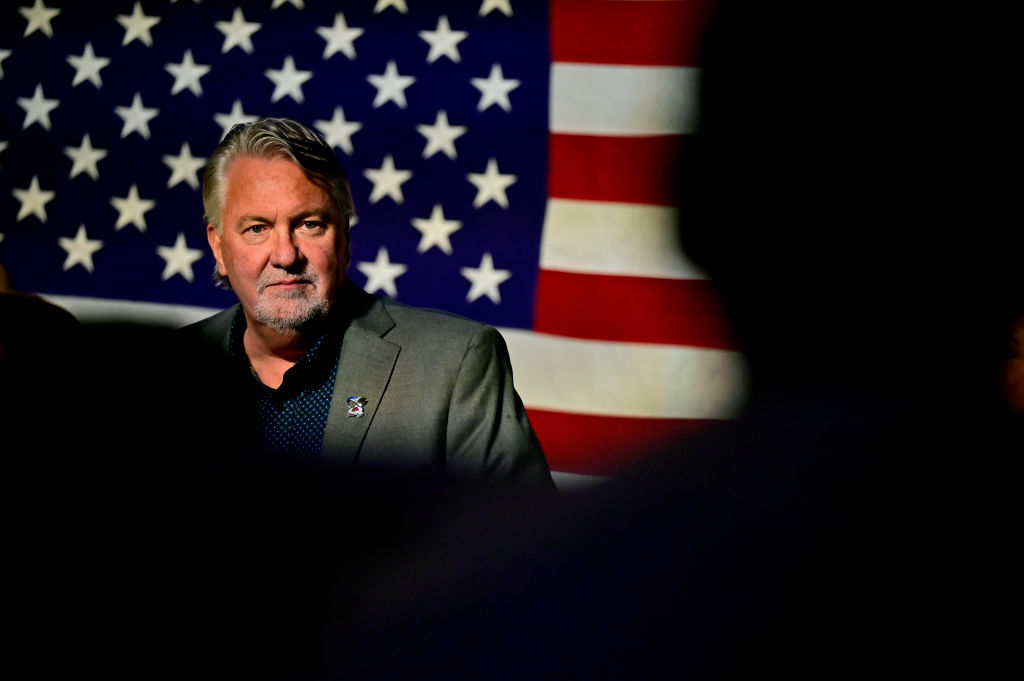
This article is part of The D.C. Brief, TIME’s politics newsletter. Sign up here to get stories like this sent to your inbox.
Joe O’Dea likes to campaign as a moderate in Colorado, a state where O’Dea’s fellow Republicans haven’t had a whole lot of success of late. He likes to highlight his support for the bipartisan infrastructure bill that President Joe Biden—who won Colorado by 13 points—signed into law. He sees value in the Inflation Reduction Act’s $4 billion earmark for easing the pain caused by the drought along the Colorado River. And he criticizes the Supreme Court’s decision in Dobbs that ended federal protections for abortion rights.
Such a posture is leaving national Republicans slightly optimistic about their chances to deny Sen. Michael Bennet a third term. After all, the midterm landscape in Colorado is very different from Georgia, Pennsylvania, Arizona, Ohio, and—depending on the results Tuesday—potentially New Hampshire, where Republicans are struggling with fumbling Senate candidates in an environment that should favor the GOP. Sure, Colorado is tough for Republicans and antipathy toward former President Donald Trump turned the state very blue in 2020, but O’Dea isn’t one to wrap his arms around Trumpism or even the Republican Party. In fact, O’Dea’s first ad didn’t even mention his Republican affiliation, and he is the lone Republican nominee in a competitive Senate race this cycle not to have Trump’s endorsement.
Part of the reason for the non-endorsement is O’Dea’s blunt assertion that Joe Biden won the presidency in 2020 fairly, and his willingness to say aloud that he would prefer Trump not seek the nomination in 2024.
Pretty reasonable and responsible, right? And in Colorado, that might just work; Republicans just need one net pick-up seat to claim the Senate majority, after all. O’Dea has impressed Washington Republicans with his discipline and willingness to campaign as his own man. Plus, his background as a fourth-generation Coloradan is a factual contrast with Bennet, who moved to Colorado in 1997 after being born in India and raised in Washington, D.C.
Well, don’t pick the scab too strongly. O’Dea’s preferred alternatives to Trump include Florida Gov. Ron DeSantis, who continues to nurse doubts about Biden’s legitimacy by pushing the lie that the 2020 election was beset with fraud. DeSantis has also treated the congressional probe of the Jan. 6 insurrection at the Capitol as a witch hunt and has campaigned for avowed election deniers. So while O’Dea is no buyer of MAGA mania, he isn’t exactly kicking Trumpism to the curb, either, with his support for DeSantis.
Such a dance is yet move evidence that efforts by much of Washington to separate Trump’s rhetoric from the rest of the Republican Party remain woefully insufficient. Trump’s influence over the modern Republican Party is deep. With his support for expanding renewable energy projects and at least limited abortion rights, O’Dea is pitching himself as a less extreme figure in his party. He is adept at sanding off the rough edges that scratch the chalkboard when other candidates promote such ideas.
At the end of the day, though, O’Dea also likes DeSantis, who is cementing his spot as the Trumpiest alternative to Trump himself in 2024. DeSantis—along with more than a dozen other contenders—are jockeying for position in the silent primary that is already underway, with consultants, fundraisers, staffers, and even debate hosts looking to make sure they’re top of mind for the would-be contenders.
Which is why O’Dea’s posture matters well beyond Colorado’s borders. O’Dea defeated a Trumpy election denier for the GOP nomination in a state that, at least until 2008, was part of the reliably red Mountain West. Democrats have made inroads and defended their new ground, but not even the most shameless Democratic partisan thinks the once-mighty Colorado GOP can’t make a comeback.
The national outside spending groups so far aren’t investing in the state, and with good reason. Polls show Bennet with a comfortable advantage over O’Dea, and fundraising reports point to a much clearer leg-up for Bennet, who has ten-times O’Dea’s cash on hand. Democrats have about a 10-point head-start in active voter registration, according to the state Secretary of State’s office. A relatively meager $9 million in television ads have aired or been reserved so far—a shadow of the $46 million two years ago in the Senate race in Colorado.
But Colorado is a tricky state, and leaders in both parties worry the race could tighten, especially if there are any hiccups in the final weeks. If O’Dea were to win, part of the blame would go to national Democrats, who sought to rig the GOP primary by spending on ads to cast O’Dea as a moderate in the hopes of disqualifying him among Republican primary voters and boosting a full-bore MAGA adherent and election denier, state Rep. Ron Hanks. (Hanks joined the crowd at the Capitol on Jan. 6 but says he did not enter the building that day.) The plan not only didn’t work, it may now entirely backfire as O’Dea has embraced the very moderate label that national Democrats created for him during the primary.
Make sense of what matters in Washington. Sign up for the D.C. Brief newsletter.
More Must-Reads from TIME
- Cybersecurity Experts Are Sounding the Alarm on DOGE
- Meet the 2025 Women of the Year
- The Harsh Truth About Disability Inclusion
- Why Do More Young Adults Have Cancer?
- Colman Domingo Leads With Radical Love
- How to Get Better at Doing Things Alone
- Michelle Zauner Stares Down the Darkness
Write to Philip Elliott at philip.elliott@time.com